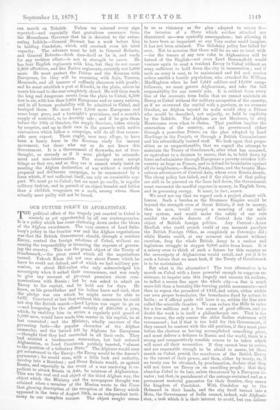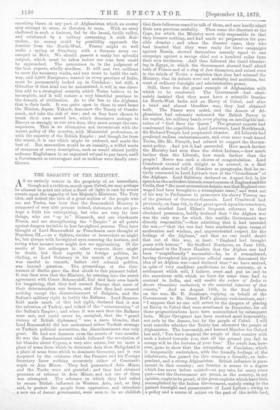OUR FUTURE POLICY IN AFGHANISTAN.
Envoy to his capital, and he hold out for days. He knew, as his grandfather and his father knew and said, that the pledge was one which he might never be able to fulfil. Convinced at last that without this concession he could not stop the British march—Lord Lytton was eager to go on —and hungering for the offered subsidy of £60,000 a year, which, by enabling him to secure a regularly paid guard of 5,000 men, would have made him master in his capital, he at last consented ; and the Ministry, wholly unaware of the governing facts—the popular character of the Afghan monarchy, and the hatred felt by Afghans for Europeans —thought that they had succeeded in all their ends. They had avoided a burdensome annexation, but had reduced Afghanistan, as Lord Cranbrook publicly boasted, " almost to the position of a tributary State." The Afghans would soon get accustomed to the Envoy ; the Envoy would be the Ameer's paymaster ; he would soon, with a little luck and audacity, develop into a Resident ; and Great Britain would, as against Russia, and especially in the event of a war rendering it ex- pedient to attack Russia in Asia, be mistress of Afghanistan. This was the real end and object of the third Afghan war, the object which the Ministry and the newspapers thought was attained when a member of the Mission wrote to the Times that glowing description of the reception of the Envoy which appeared in the issue of August 30th, as an independent testi- mony to our complete success. The object sought seems to us as visionary as the plan adopted to secure it— the invasion of a State which neither attacked nor threatened us—was cynically unscrupulous ; but allowing it to have been as important as any Tory orator could imagine, it has not been attained. The Salisbury policy has failed for ever. Not to mention that there will be no one to treat with —for the tenure of any new ruler in Afghanistan will be hatred of the English—not even Lord Beaconsfield would venture again to send a resident Envoy to Cabul without an army sufficient to hold down the city in insurrection ; and if such an army is sent, to be maintained and fed turd receive orders amidst a hostile population, who attacked Sir William MaoNaghten when he had 3,849 soldiers and 12,000 camp- followers, we must govern Afghanistan, and take the full responsibility for our vassals acts. It is evident from every line of the accounts from India that we cannot maintain an Envoy at Cabul without the military occupation of the country, as if we overawed the capital with a garrison, as we overawe Gwalior, no Afghan beyond its walls would obey a Prince who would be described, not unjustly, as held in captivity by the Infidels. The Afghans are not Mexicans, to obey Montezuma even when in chains. That position implies the annexation of the country, and its government either through a powerless Prince, on the plan adopted by Lord Harding° in the Punjab, or through a British Commissioner and his scientifically trained staff. We look upon that propo- sition as so unquestionable, that we regard the attempt to maintain the Treaty of Gundamuck, after what has occurred, as equivalent to a decision to annex, that is, to hold down by force and administer through Europeans a poverty-stricken hill- country as large as France, and to defend its boundaries against all its neighbours,—Russia, Persia, China, and the fanatic Mus- sulman adventurers of Central Asia, whom even Russia dreads. The cheap policy has failed, and if the objects of that policy are still to be pursued on the lines laid down, the Government must encounter the needful expense in money, in English lives, and in governing energy. It must, in fact, annex.
We need not say that we regard such a project almost with horror. Such a burden as the Douranee Empire would be beyOnd the strength even of Great Britain, if not in money, then in men, would compel a recasting of our mili- tary system, and would make the safety of our rule amidst the sterile deserts of Central Asia the main object of British foreign politics. Any Central - Asian Moollah who could preach could at any moment paralyse the British Foreign Office, as completely as Cetewayo did ; while Russia could, at any moment and almost without exertion, drag the whole British Army to a useless and inglorious struggle in steppes 8,000 miles from home. It is a misery even to think of such a future for this country as the sovereignty of Afghanistan would entail, and yet it is to such a future that we must look, if the Treaty of Gundamuck is to be maintained.
But what is the alternative ? The true alternative is to march on Cabal with a force powerful enough to suppress re- sistance, to inquire into this tragedy and execute its authors, to inflict a severe fine upon the whole city—a fine is much more felt than a brutality like burning public monuments—and then to repeat the precedent of 1842, and retire, either within our own proper boundaries, the boundaries fixed by nature to India ; or if official pride will have it so, within the line now called the scientific frontier. We can reduce the Hills to order for a few millions and a few scores of good officers, and no doubt the work is in itself a philanthropic one. That is the true course, the only course the abler Indian statesmen will recommend ; but if that is too bold for this Government, if they cannot be content with the old position, if they must pose before the electors as having accomplished something great, and must deliver a defiance to Russia and the world, there is a strong and comparatively sensible course to be taken which will meet all their necessities. If they cannot bear to retire, and are reasonable enough to be afraid to annex, let them march on Cabul, punish the murderers of the British Envoy to the extent of their power, and then, either by treaty, or, if no treaty can be obtained, by proclamation, declare that they will not force an Envoy on an unwilling people ; that they abandon Cabul to its fate, unless threatened by a European in- vader; but that, in punishment of the outrage sustained and as a permanent material guarantee for their frontier, they annex the kingdom of Candahar. With Candahar up to the Helnaund in their hands, and the city itself turned into a Metz, the Government of India cannot, indeed, rule Afghani- stan, a task which it is their interest to avoid, but can deliver
smashing blows at any part of Afghanistan which an enemy may attempt to cross, or threaten to cross. With an army sheltered in such a fortress, fed by the broad, fertile valley, and reinforced by a railway connecting it with Kur- rachee, no enemy could by possibility approach the frontier from the North-Vest. France might as well make a spring at Strasburg with a German army en- camped in Metz. We should possess a costly but splendid outpost, which must be taken before our true base could be approached. The precaution is, in the judgment of the best experts, wholly needless. It will cost two millions to erect the necessary works, and two more to build the rail- way, and 5,000 Europeans, wanted in every province of India, must be permanently locked up in Ormdaliar ; but still, a Gibraltar of that kind can be maintained, it will in one direc- tion add to a strategical security which Tories believe to be incomplete, and it will restore a very beautiful province to the domain of civilisation. As to the loss to the. Afghans, that is their fault. It was quite open to them to send home the Mission, depose Yakoob, denounce the Treaty of Gunda- muck, and take the risk of war ; and as they have chosen to break their own sacred law, which denounces outrage to Envoys as strongly as our own does, they must accept the con- sequences. This is an alternative not inconsistent with the recent policy of the country, with Ministerial professions, or with the capacity of the British Empire ; and though far from the wisest, it is one which might be endured, and made the best of. But annexation would be an insanity, a wilful waste of resources of every description, such as would almost justify ordinary Englishmen in an organised refusal to pay taxes, until a Government so extravagant and so reckless were finally over- thrown.



































 Previous page
Previous page